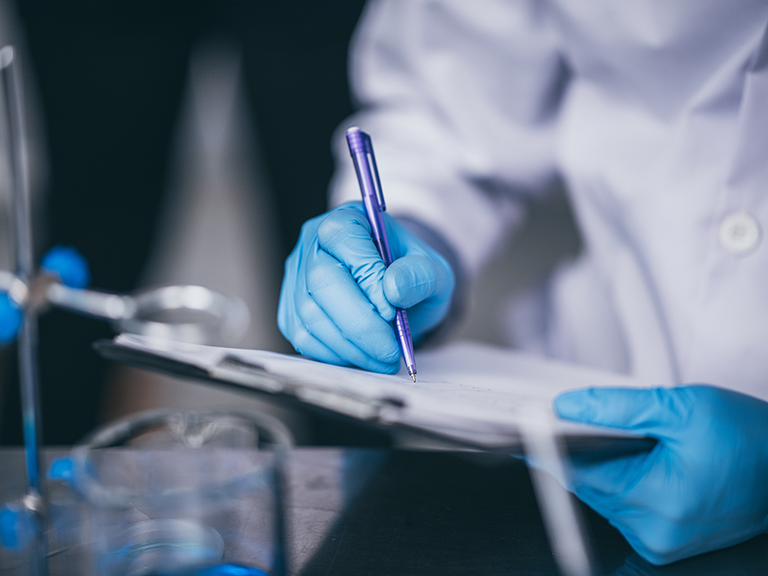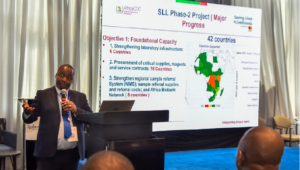Our Expertise
Home » Quality Systems, Standards, Regulation and Accreditation
Quality Systems, Standards, Regulation and Accreditation
ASLM plays an important role in improving the quality of laboratory services across the continent, striving to fulfil certification and accreditation requirements that are consistent with national, regional, and international benchmarks.
Quality Systems & Standards
As healthcare systems increasingly recognize the importance of laboratory diagnostics in patient management and public health initiatives, the ASLM’s efforts become crucial in ensuring that laboratories operate at optimal levels of efficiency and reliability. We work to institutionalize cost effective Quality Management Systems initiatives and standards within Governments for sustainability. ASLM collaborates with various stakeholders—including governmental bodies, non-governmental organizations, and international health agencies—to create a cohesive framework for laboratory accreditation across Africa. This collaborative approach ensures that laboratories can share best practices while navigating unique regional challenges.
Regulatory Systems
ASLM’s efforts to promote harmonized national and regional regulatory systems for laboratory personnel, diagnostic products, technologies, infrastructure and biosafety represent a significant step towards strengthening laboratory medicine across Africa. By collaborating on these initiatives, countries will ultimately strengthen the capacity of health systems to respond effectively to disease, while improving overall public health outcomes.
Successful implementation of these regulatory frameworks will help address the continent’s current healthcare challenges and pave the way for sustainable development.
Thematic Areas

Improving the quality of laboratory services across the continent
We are dedicated to strengthening laboratory quality and safety across Africa, enhancing diagnostic reliability, and improving public health responses. Through partnerships and specialized programs, we support the establishment of quality assessment and proficiency testing across regions, helping over 900 labs meet high standards. Our initiatives include coordinating the WHO-AFRO SLIPTA program, with 667 labs audited and 187 achieving ISO accreditation. We also promote safer diagnostics through biosafety and biosecurity frameworks, point-of-care diagnostics, and training for high-risk pathogen handling. In collaboration with global and regional organizations, we are building resilient systems to support diagnostic excellence across the continent.
Here is our impact below.
At a glance
- Established regional capacity to provide bacteriology External Quality Assessment (EQA) Proficiency Testing (PT) panels.
- Supplied HIV Viral Load/EID proficiency testing samples to 110+ laboratories across 13 African countries.
- Enrolled 900+ laboratories continent-wide in SARS CoV-2 Molecular EQA from 2020–2023.
- Developed guidance for establishing a National Laboratory Quality Framework.
Laboratory Improvement and Accreditation
- Secretariat of the WHO-AFRO SLIPTA (Stepwise Laboratory Improvement Process Towards Accreditation) program.
- SLIPTA participation by 28 countries with 667 labs audited and 301 certified auditors across 24 countries.
- Supported 187 laboratories in 16 countries in achieving ISO accreditation after completing SLIPTA.
- Published 100+ articles on Quality Management Systems (QMS) in the African Journal of Laboratory Medicine.
- Extended quality management support to animal health laboratories, training 50+ veterinarians and 20+ SLIPTA auditors.
Diagnostics and Biosafety Frameworks
- Developed an in vitro diagnostics (IVD) regulation framework for outbreak response.
- Updated guidelines for point-of-care diagnostics implementation.
- Conducted technology evaluations for WHO Prequalification of HIV and TB molecular techniques.
- Founding member of the African Collaborative to Advance Diagnostics and advisor to Africa CDC’s Diagnostic Advisory Committee (DAC) on IVDs.
- Established a continent-wide legal framework for biosafety and biosecurity, adopted by 10+ countries.
- Operationalized 5 biosafety and biosecurity Technical Working Groups and 3 regional Centers of Excellence.
High-Risk Pathogen Management
- Developed regulatory frameworks for institutions handling high-risk pathogens.
Trained 80+ implementers in 35 countries on safe pathogen management practices.



